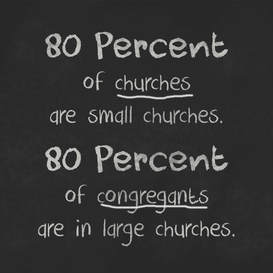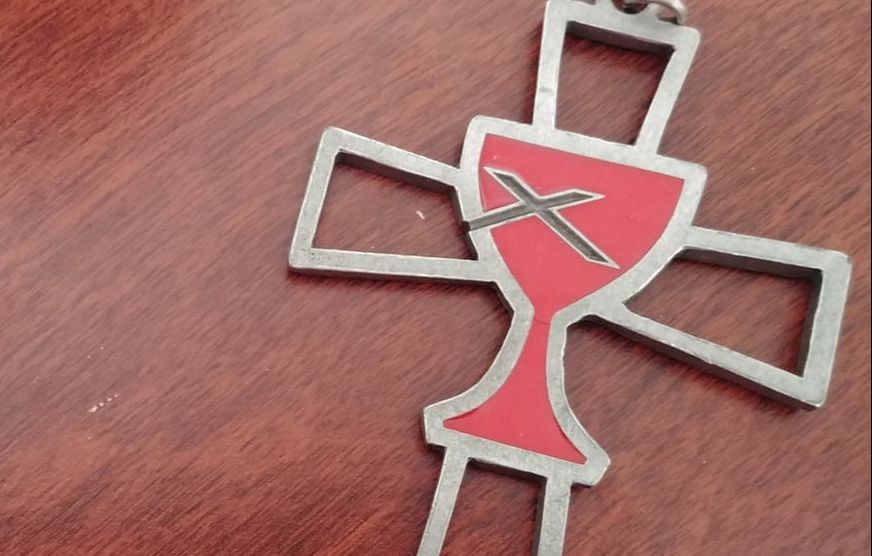|
-Rev Melissa Fain- Once again, this meditation came about as I'm writing Fig Tree Christian's Plan of Action. The General Church is dying.Here's what happened; Small churches began to feel the loss of congregants through death, moving, or general dissension. Those that left because of disagreements or moving, found larger congregations somewhere else. These larger congregations suddenly thought they must be doing something right. Their numbers were growing. This was the false positive of the 90's. The warning bells were sounding. Intelligent people began looking at the numbers. Church membership as a whole was in decline, but most of us couldn't see it, because we were leaving the declining churches. We were pooling our resources in bigger churches. This wasn't done knowingly. We simply sought congregations that had the resources. When we found those congregations, we added our resources to the mix, which in turn made the congregation more inciting for someone else looking for something like they left or something better.  I've heard this statistic thrown around, and I've personally tossed it around a few times myself: Eighty percent of of churches are small, and Eighty percent of congregants are in medium to large churches. That would mean most of the church population was feeling the false boom of the 90's when the problem first began. Meanwhile, we were horrible at evangelism. Back in the 50's the Greatest Generation (the ones who fought in WWII) basically bulldozed the the doors down to get in church. They simply wanted to be there so the church didn't have to try. That made us lazy. We stopped teaching evangelism, which meant no one was learning how to do it. Today, our numbers are mostly cannibalism of dead or dying churches. As we draw in to where the resources are, it is now only the mega-churches that are truly living into the world of false positives. All the other churches can feel the slow death upon them. Church plants! That's the answer, right? Guess which organization is currently planting churches today? That's right! Those who have the resources. Their survival is only because of what I just explained. This causes these organizations to falsely believe they are doing something right, when they are only doing what every other church has or is currently doing. They are only the lucky congregation that is receiving the dead's inheritance. When these churches plant, they seed mini-mes. In their mind it works for them so it must be right. Instead, their trademarked mini-me is one step closer to leading the Body of Christ to disaster. Well, that's depressing. What can be done? The simple answer is for these mega-churches to create a group of creative individuals to field test the potential for church today. Simple, but nearly impossible. Years ago when smaller churches were not bleeding out yet, I got one on my side. We began just what I mentioned. We explored our connection to God in today's society. Then traditional church began to slowly creep. By the time I stepped away, it was merely a praise service. It's exploration sucked away for comfort. The Traditional Creep- Creepy; not CatchyThat creep, my friends, is the biggest hurdle to reversing the course and growing the church. Back a few years ago, I compared this creep to something else: grafting. When it comes to plants, grafting can be great. Weaker trees with sweeter fruits can have their branches transplanted to heartier trunks. It's also a way to maintain integrity. Did you know every seed in an apple is a new breed of apple? Most of those breeds are just good ole' crab apple. To keep all our apples from being duds, branches from already grown trees are grafted to new saplings, keeping all those delicious flavors producing on new trees.
I submit this is a bad thing when it comes to the modern church. We graft the hell out of small churches. Follow me here, and I'll think you'll understand how this is bad: I've physically seen this a few times now, so it's more than an aberration. I equate calls, to God planting a seed in our heart. Now, that's pretty generalized, and I understand that, but I think it's also an accurate generalization. When God plants that call, it's for that specific call to be grown, and the uniqueness of that call is exciting. Yet, we get scared. No! Terrified! When that call is to plant a church, we get downright petrified we are being called to crab apples! So, at some point in it's infancy we oh so lovingly take a knife to God's call and oh so gingerly cut it's potential down to graft what we are comfortable with right on top. God has been trying to grow orchards for decades, filled with good fruit meant for the future Body of Christ, and we've been too afraid to trust God's call. We haven't been bold enough to say "no" when grafting happens. We must allow ourselves to sit in discomfort, because that's where God is calling us. Discomfort is not always bad. Discomfort is the feeling before growth. Discomfort is labor pains (which I personally know).Discomfort allows us to make tough decisions regarding letting go of things that no longer help us. Discomfort comes with the feeling of beginning something healthy. Today over 100 youth and adults gathered in a funeral home because someone's heart stopped. That's the long and short of it. We want life to work out like the movies tell us it should. People who are good live long and fruitful lives, and people who add nothing to society pass away sooner than most. Today was a reminder that that's just not the case.
I write this eulogy today not because Lisa was a member of Fig Tree. She was not. More than likely she had no knowledge of anything Fig Tree Christian related. I also don't write it because we were terribly close. In reality I barely knew her. So, why am I doing this? Something was lost today, but I want to redeem it this evening. Lisa's heart stopped, but it never died. It lives on in ways that will impact that Paulding Community for generations. Last Summer I sat at my computer for about 5-6 collective hours taking various online classes. Why? That previous Spring I took an outdoor class with Lisa. She was so proud of the Pickett's Mill Scout district, She beamed as she announced our district had the most trained adults. I can't lie, she is the real reason the Webelos Pack 687 went to Raccoon Mountain. Her training on that day gave me the confidence to plan that weekend trip. That trip empowered other adults who are now planning a new trip for the next group of Webelos. Her passion impassioned me, who impassioned others. She is the reason my son wants to volunteer as a Boy Scout at Day Camp. Pickett's Mill Cub Scout Day Camp was Lisa's baby. She nurtured and grew it. My son went to day camp from Wolf to Webelos II. Now, seeing how fun it has been for my son, my daughter gets to go for the first time as a Tiger Scout, and my son goes back to help make it happen. This is the truth of life. Her heart lives on. Yes, we feel the chasm created from her death, but her impact will live on forever. Those she has impacted will impact others, who will then impact others. While we still wait to meet her in another life, there are echos and ripples of her heart that beats in each and every one of us. Her heart has touched me, and that connection will be with me in some form for the rest of my life. -Rev Melissa Fain -Rev Melissa Fain- I'm going to lay out two important points. First, I'm going to also explain why traditional evangelism is not working. Second, I'm going to explain why the church needs to focus more on the internet. Traditional Evangelism Cannot Work TodayStick with me because I think this is going to make a metric ton of sense if you read what I have to say. Generally speaking, the average human understands culture as geographical, as in, cultures are separated by land masses. Probably because of propaganda during the World Wars, our first thought turns to National Cultures. Whether we want to admit it or not, we still have an American culture. Beyond that, I would say, most everyone would also be able to see smaller cultural identities. For example, in the United States, there is a Southern Culture, just as much as there is a Californian or Texan culture. Now, you might not be considering it, but socio-economic circumstances create cultural norms as well. There is a culture to affluence as much as there is a culture to poverty. There are also cultures around ideas or things. There is a sports culture, as much as there's a crafting culture. Even though I haven't played in a band in decades, I understand and know the band culture, and can slip back in when needed. I can translate that language. Finally, families have their own culture. This is one we don't normally consider because our family culture is our base. We are born into it, and subconsciously or consciously, we judge everything around us by it. Now, back in the 1950's, similar family cultures lived nearby. It was a good shot that your neighborhood would be filled with family cultures that were relatively the same. This was because people grew up and stayed in their community. This made evangelism easy too. Not only were WWII soldiers coming home and flocking to community organizations, the communities themselves were culturally similar, making it easy to speak and connect with one another. Then something happened. Travel. Mass-transit to be exact. It used to be, if you wanted to work in the city, you had to live in the city. Then the automobile came and if you wanted to work in the city you had to at least live in the suburb of the city. Now there are people who live hundreds of miles away from their office, and they fly in during the week, and go home on the weekends. Our cultures are mixed beyond measure. No longer are we laying down roots. Instead, we are dropping an anchor. There is nothing permanent anymore about the word, "home." What does this have to do with traditional evangelism? Because of how we travel and live, churches rarely mirror the culture they are rooted in. Even then, we are still using census data to help us understand the people outside our doors, When it comes to evangelism, the census is drastically flawed. Census data assumes two things: First, that there is a mass of similar people living in your area. True, they all might be making a similar amount of money, be around the same age, and other basic information, but those people are from all over. They are simply anchored by your specific congregation. Second, the Census data looks for things we can quantify. The base culture, the family, isn't something the Census can read or know. Those family cultures are becoming more and more jumbled. Evangelism, as we understood it, was reaching a demographic, when it needs to be a family by family event. Back to the internet. We, as a people, feel that disconnect. We want to hang out with like-minded individuals. We don't feel comfortable getting to know our neighbor, because that requires learning a new culture. It's like learning a new language, and terrifies some, and overwhelms others. That's when the internet comes in. Why Must It Be Online?People are finding their voice online. Cultures are coming together around niche ideas and thoughts. For better and worse- the internet gives us communion. Like it or not, we are apprehensive in real life, and willing to connect online. If the church truly wants to evangelize, it now must be online.
I sat in a board meeting about 15 years ago listening to people talk about the advertising budget. For years, they paid $15 a month to have a larger ad in the phone book. Congregants concluded that people were not looking for churches in a phone book anymore, and they could make a free website, so they did away with their advertising budget. Let's trade out the word "advertising" for the word "evangelism." This church basically did away with their evangelism budget because they saw the internet like a bulletin board instead of a community. Consider this: Instead of using the internet to let people know the church is here, use the internet to let people know the church knows they are real and loved by God. -Rev Melissa Fain- Today I'm going to use Ready Player One as an example, but there are NO SPOILERS in this meditation. Last Saturday we went to see Ready Player One as a family. My husband, son and myself had all read the book to varying amounts of enjoyment, so we were curious what Steven Spielberg would do in adaptation. A scene stuck out to me. IOI was wanting to know what they would do with control of the Oasis, or internet. Their solution? Sell add space. Ready Player One aside, a couple of years ago on the show Survivor, Jeff Probst actually had to make a statement about in game ads. (Certain challenges or buildings are named after products.) He very bluntly told the fans, ads are how one gets a free product. Then don't get me started on the gaming culture. I truly believe phone games intentionally make the ads annoying so you will pay $2.99 to get rid of them. The PC and console gaming can't put ads into their products because consumers bought the game first. Instead, they try to equal out with loot boxes, or in game content. I bet, if they began giving the option for in game commercials for new content, users would take it over paying $10-$20 for the new level. Then we get to church. While we will live with ads in our games, movies, and television- most if not all will draw the line at our church. Why?
Ads are not evil, but they are surely not good in a church environment. Fig Tree doesn't do ads. That's why there wasn't an app last Advent. There was no way to do it without ads, so it was dropped. The website has NEVER EVER had ads. Sharing the content here will not put a cent in anyone's pocket. Fig Tree is about the message; not the bottom line. -Rev Melissa Fain- First of all, before I go any further, Fig Tree exists. Nothing died in it's entirety yesterday. Now let me get to the reason why yesterday happened: Failure is always an option. I feel as though that's a foreign statement in today's churches. It's as though assuming failure negates God's presence. If anything, admitting failure is the time God is more likely to step in and help. Admitting failure is admitting humanness. It is our nature to fail, and it is in God's nature to extend Grace when we are willing to accept it. Failure is also how we learn. This hasn't been Fig Tree's first failure, this is just the first one I've been open about. Most recently, the Lenten Devotional failed this year. Getting the Advent Devotional together this year took too much time, and I couldn't get the ball rolling fast enough on Lent to get the writers going. I see how I failed, and I will make conscious choices in future devotionals. But, devotionals as a whole work here because of previous failures before that. Fig Tree has grown from the compost of failure. Something doesn't work, tear it apart and use it to feed something new. Why the Livecast was Failing
-Rev Melissa Fain- "You are not alone." This is the uplifting point of Dear Evan Hansen, a Broadway musical that won Best Musical at both the Tony's and the Grammy's. It takes on some serious issues as it delves into anxiety, depression, and suicide, talking about the impact on families and on the people who are dealing with those problems. The statement, "You are not alone," goes viral, when the lead character speaks those words at a memorial for a young man who committed suicide. Notice the words. They are negative. We could simplify that sentence by saying "You are loved," or "You are wanted." Instead, we are pitting the world against loneliness. Honestly, considering people are far more likely to share a negative sentiment, it makes more sense that the drive is written in the negative. I wouldn't believe a video with the phrase "You are loved," would go viral. If that bothers you, keep reading. Like my title. I knew I could write, "This is a Good Post," but I also know something happens when I phrase it in the negative. You are drawn to what you consider is bad. You know what a bad post is. You know what to expect. Maybe it's a very clunky background that makes it difficult to read the post itself. Perhaps it's a convoluted message that appears pulled from an impromptu sermon. Maybe it's a page of text with nothing that breaks it up. It could be the post says nothing at all. (These are all things Fig Tree has suffered through, so I point the finger squarely at myself.) There are also promises involved. I have told you this isn't a bad post. You do not know, before clicking the link, if I am going to deliver on that promise. Therefore, it's the internet version of gambling. The only cost to this gamble is time, so you are more likely to play- especially if the whammy means you are only stuck with the negative. When the post or video actually does deliver on it's promise, you are more likely to press that little upvote button. You won! That was nice. Thank you. If the post fails, you want to share in that outrage. It's like giving fake lotto tickets to your closest friends. It's fun to know you are raising their hopes before dashing them to pieces. Then they are more likely to do the exact same thing. Posts that payoff are paid with upvotes. Posts that trick you into trash or negative feelings are shared... and gain more money from those sweet clicks. Guess what professional blog and vlog writers are more likely to create? (Side note- Fig Tree gains nothing monetarily through visiting the website. We don't have ads, and why will be a post next week. Share away!) That's why it's interesting that Jesus tells the women at the tomb (and generally God tells pretty much everyone) "Don't be afraid." But Jesus met them and greeted them. They came and grabbed his feet and worshipped him. Then Jesus said to them, “Don’t be afraid. Go and tell my brothers that I am going into Galilee. They will see me there.” How easy would it had been for God to say, "Stay calm." "It's Okay!" or simply "Peace"? Instead we get this phrase that returns time and time again, "Do not be afraid." That's not to say the positive is forgotten. The word "Peace" comes up over 400 times. It's said four times as much as "Do not be Afraid." We need that relationship of four to one. God's message is meant to be shared, but we simply don't share the GOOD news. It needs to be said four times as much just to get the coverage the scary stuff gets naturally.
That being said, the negative has to be shared too, but couched and honestly told in an uplifting way. Do not be afraid. That statement understands and raises what is scary and wrong, while calling it out as wrong. In the scripture I quoted, it accepts how scary pre-resurrection was, and letting the women know there is no longer anything to fear. In many ways, Evan Hansen's saying "You are not alone," is the modern equivalent. Yeah, you're scared. You feel you are doing this alone, but don't be afraid, you're not really alone. That's not scary at all, is it? |
Categories
All
Archives
October 2023
|







 RSS Feed
RSS Feed